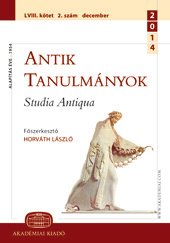Uralkodói propaganda Ioachimus Vadianus Mela-kommentárjában
Dominant propaganda in the commentary of Ioachimus Vadianus's Mela
Author(s): Bobay OrsolyaSubject(s): Ethics / Practical Philosophy, 16th Century, Theory of Literature
Published by: Akadémiai Kiadó
Keywords: Joachimus Vadianus; Pomponius Mela; De chorographia; Maximilian I; Sigismund of Jagello; ancient sovrains; early modern sovrains; imperial congress in Wien; siege of Smolensk;
Summary/Abstract: The Helvetian humanist, Joachim von Watt’s commentary on Pomponius Mela’s De Chorographia was published first in 1518. It was the first scientific treatment of the ancient geographer’s work after the Venetian humanist, Emilio Barbaro’s philological commentary (Castigationes in Pomponium Melam). We can distinguish two types of the ancient and the modern rulers in the lemmas of the commentary: the good and the bad monarchs. This interpretation of the commentary shows how humanists gave a new content to an ancient work, glossarists could also give useful information to contemporary readers this way. Th is intention can not be realized in Vadianus’ later work, the Epitome Trium Terrae Partium. The two extreme examples for the case of the bad and the good rulers are Alexander the Great and the Polish king, Sigismund I Jagiellon, all of other rulers can be found between these two ones in the aspect of monarchs’ merits. Vadianus wrote about the bad ancient sovereigns on the base of old clichés: we can read about Nero and Caligula, but the late Roman emperor, Pertinax also appeared in the lemmas. According to the Helvetian humanist his bad acts were to be condemned, although these moral aspects were not appeared among Historia Augusta’s biographies. The good ancient rulers were charaterised by good morals, for example Antoninus Pius or Marcus Aurelius. Vadianus mentioned a new aspect in the case of the modern sovereigns: the gift for warfare became also an important aspect beside morals. According to Vadianus a good ruler could reconcile these aspects with each other, and could remain humane. He mentioned Maximilian I Habsburg and Sigismund I Jagiellon as examples for good monarchs.
Journal: Antik Tanulmányok
- Issue Year: 58/2014
- Issue No: 1
- Page Range: 79-92
- Page Count: 14
- Language: Hungarian
- Content File-PDF

